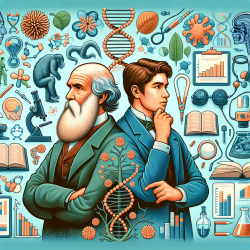Bridging Historical Insights to Modern Practice
In the realm of speech-language pathology, where data-driven decisions are paramount, understanding the foundational principles of biology and evolution can enhance our practice. The research article "Mendel and Darwin: Untangling a Persistent Enigma" provides insights into the scientific interactions and mutual influences between two of the most prominent figures in biology, Gregor Mendel and Charles Darwin. This historical perspective can inspire practitioners to refine their approaches and encourage further research into the biological underpinnings of speech and language development.
Understanding the Mendel-Darwin Connection
The research article explores how Mendel, known for his pioneering work in genetics, was influenced by Darwin's theory of evolution. Despite Darwin's lack of awareness of Mendel's work, Mendel's annotations in Darwin's books suggest a deep engagement with evolutionary concepts. This interaction highlights the importance of interdisciplinary learning and the integration of diverse scientific theories to enhance understanding and application in practice.
Applying Evolutionary Insights to Speech-Language Pathology
For practitioners in speech-language pathology, the principles of evolution and genetics are not just historical curiosities but are foundational to understanding the biological basis of language acquisition and disorders. Here are some ways these insights can be applied:
- Genetic Influences: Understanding the genetic components of speech and language disorders can guide personalized intervention strategies. Just as Mendel's work laid the groundwork for genetic inheritance, modern genetic research can inform the identification of hereditary speech disorders.
- Evolutionary Perspectives: Darwin's theory of natural selection can be applied to understand the evolutionary development of language. This perspective can help practitioners appreciate the adaptive nature of language and its role in human evolution, influencing how we approach language learning and rehabilitation.
- Data-Driven Decisions: Mendel's meticulous data collection and analysis serve as a model for evidence-based practice. Practitioners can emulate this approach by rigorously collecting and analyzing data to inform therapy decisions, ensuring interventions are grounded in solid empirical evidence.
Encouraging Further Research
The historical interplay between Mendel and Darwin underscores the value of continued research and exploration. Speech-language pathologists are encouraged to delve into the biological aspects of language development and disorders. By doing so, they can contribute to a more comprehensive understanding of the field, much like Mendel and Darwin advanced biology through their pioneering work.
Conclusion
Incorporating the insights from Mendel and Darwin into speech-language pathology can enhance our understanding and practice. By appreciating the historical context and applying these principles to modern challenges, practitioners can improve outcomes for children and contribute to the field's advancement. To explore the original research paper, please follow this link: Mendel and Darwin: untangling a persistent enigma.










